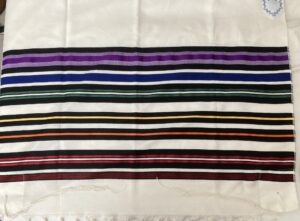Shalom, u’vracha!
I was inspired to write this after recently reading a wonderful piece you can read here from my teacher, Rabbi Ebn Leader. In it, Rabbi Ebn compares and contrasts Van Gogh’s process of creating art with Rebbe Nachman’s thoughts on how prophesy creates a vision for a better world. In both cases, they use a combination of imagination together with observing what is real in the world.
After reading it, I noted that the content of Rabbi Ebn’s article was similar to an excerpt of Reb Zalman (you can read it in its original Hebrew here) from his Sefer, Yishm’ru Daat, pp. 62-63. I have decided to publish it along with Reb Zalman’s translation and commentary, taken from two recordings of Reb Zalman giving this piece over. May we together imagine and then bring about a better world, as we are in a very difficult time now, כן יהי רצון במהרה בימינו אמן:
נשא את ראש בני וגו’, (במדבר ד’ ב’)
Raise a headcount of the children [of Israel] (Numbers 4:2).
נשיאות ראש, כדי שהשכל יהיה לבוש לנשמה השכל צריך להתפשט
Raising the head: In order that the sechel / the mind, the intellect, should be a garment for the soul, the sechel has to spread itself
ולהרחיב
and it has to make a lot of wide space.
“On the level of פשט / p’shat / the simple meaning, the נשיאות ראש in the beginning of the Book of Numbers is a counting and, the counting is always done with this phrase, naso et rosh / Raise a headcount.
“We can take the drash / interpretation a little further, and say that when a person is treated as just a number, their humanity is reduced; they become an object. And this was one of the first things that the Nazis did; they would take away the name of the person and reduce them to a number.
“But here, I am not talking about the p’shat. The word, naso, also means to lift. So how can we lift the head?”
על ידי (תהילים כ”ד ז’) שאו שערים ראשיכם — (משלי ל”א כ”ג) ונודע בשערים בעלה –
It does it by opening the gates of your head (Psalms 24:7). And in Mishlei (21:23) it says, “her husband is known in the gates.”
שערים ההשערות (ל’ ערות בשפעל)
And I translate the word שערים as השערות. It means the imaginal openings, from the word ערות, awakeness in the שפעל which puts a shin in front of that.
Here is how he explained his translation of this word, שערים / gates.
Read the rest of this entry »
